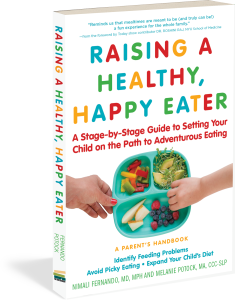 This guest blog comes from Melanie Potock, MA, CCC-SLP, and Nimali Fernando, MD, MPH, authors of Raising a Healthy, Happy Eater: A Parent’s Handbook: A Stage-by-Stage Guide to Setting Your Child on the Path to Adventurous Eating. Melanie Potock is an international speaker on the topic of pediatric feeding disorders. With more than 15 years of experience as a food therapist and eating coach for all children, including those with special needs, she is a go-to resource for anything related to kids and food. Nimali Fernando is a Virginia pediatrician and founder of the nonprofit the Doctor Yum Project, the popular recipe and parenting website doctoryum.com.
This guest blog comes from Melanie Potock, MA, CCC-SLP, and Nimali Fernando, MD, MPH, authors of Raising a Healthy, Happy Eater: A Parent’s Handbook: A Stage-by-Stage Guide to Setting Your Child on the Path to Adventurous Eating. Melanie Potock is an international speaker on the topic of pediatric feeding disorders. With more than 15 years of experience as a food therapist and eating coach for all children, including those with special needs, she is a go-to resource for anything related to kids and food. Nimali Fernando is a Virginia pediatrician and founder of the nonprofit the Doctor Yum Project, the popular recipe and parenting website doctoryum.com.
According to a Nielsen’s report, the #1 Most Common New Year’s Resolution made in 2015 was “Stay Fit and Healthy.” That broad, overwhelming goal causes gym memberships to skyrocket every January 1st, but it’s a resolution that’s rarely kept. Let’s put a different twist on “healthy” and get our butts in the kitchen…and get our kids in there, too. We’re not knocking a good workout, but a healthy family starts in the heart of the home. No need to drive anywhere, invest in membership fees or workout gear. Plus, while you’re cooking with your kids, you’ll be tackling Nielsen’s top five resolutions including#1 Stay Fit and Healthy #2 Lose Weight; #3 Enjoy Life to the Fullest; #4 Spend Less, Save More; and #5 Spend More Time with Family and Friends.
Here’s how to get the family in the kitchen, tackle the New Year’s list, and practicing some great parenting along the way:
1. Stay Fit and Healthy in the Kitchen: Despite the fact that experts recommend that children eat five servings of fruits and vegetables a day, a 2103 report from the CDC reports that more than a third of adolescents get less than one serving of fruits and vegetables a day. The average American kid-friendly diet is high in calories and low in nutrition. In turn, lifestyle-related diseases like type 2 diabetes and hypertension seen typically in adults are now seen all too frequently in children. Whether your child is a picky eater, needs to lose weight, or experiences one of a myriad of diet-related symptoms like constipation, chronic abdominal pain, attention deficit disorder, etc., making a resolution to improve healthy eating habits at home can be a great starting point for change. Let’s get back to the basics and parent consistently by offering fresh, simple foods.
2. Lose Weight in the Kitchen: Consider that high calorie processed foods meet kids at eye level in practically every checkout lane in America, making the temptation virtually impossible to escape. But spending time in the kitchen can make the difference. Hesitant eaters in particular may need to have extra time to use their sense of touch, smell, feel and even hearing before they are ready to taste a new food. When kids spend more time with you in the kitchen spinning spinach in a salad spinner and tearing it into a big salad bowl they will more quickly learn to taste and enjoy spinach. Plus, the more time they are with you in the kitchen, the less time they may be grazing on junk food and the better chance the whole family has of maintaining a healthy weight. Parent proactively by building positive experiences around healthy foods and parent patiently – don’t give up.
3. Enjoy Life to it’s Fullest in the Kitchen: Parent mindfully, focus on your kids and create a new family rule: No electronics allowed in the kitchen or dining area. Unless it’s for music – then parent joyfully and sing! Burn some calories and dance! Bang the counter with the wooden spoons, drum on those pots and pans. Grab a zucchini for your kid to use as a microphone – ham it up! Pay attention to your family by enjoying every minute, rather than rushing to put dinner on the table. Commit to twenty minutes cooking in the kitchen and twenty minutes enjoying eating together as a family.

4. Spend Less, Save More in the Kitchen: There’s no question that families can eat healthier on the cheap by cooking more at home. For kids there may be a period of trying foods that they don’t care for and may not want to finish. Parent bravely and don’t utter a peep if your child doesn’t eat the new vegetable. When your she slices a tomato for the first time but won’t taste it, that’s never a waste. The first step to eating healthy is exposing kids to simple, basic ingredients and one small tomato is a reasonable expense. Pick a veggie that someone else in the family will try, if the budget is tight. Before you can expand your family’s diet, you’ve got to expose them to the food several times. Building a relationship with food requires parenting patiently and giving it time, even if you measure it by one Brussels sprout at a time.
5. Spend More Time with Family and Friends in the Kitchen: Kids need more time with YOU! Even the youngest kids can help set the table, chop soft vegetables with kid safe knives or tear lettuce. Remember that a simple meal made with your kids is worth so much more than an elaborate meal made by yourself. You simply can’t put a price on the time spent together. When we as parents spend more time in the kitchen, we may also find ourselves parenting better, understanding our children better and communicating in a positive way. The kitchen and the mealtime table is a place of compassion, where we share the news of the day, our highs and lows, and focus on family above all else.
So parent compassionately and rediscover your kids and your family, in the heart of the home. It’s a New Year’s Resolution that you’re likely to keep.
 Melanie Potock, MA, CCC-SLP, is an international speaker on the topic of picky eating and feeding disorders in children, and the author of the parent guidebook Happy Mealtimes with Happy Kids. Her advice, found on her website MyMunchBug.com, has been shared in national publications including Parents magazine. In her over fifteen years of experience as a feeding therapist, her work visiting homes and schools to support families and children at mealtimes has been one of the most rewarding aspects of her career.
Melanie Potock, MA, CCC-SLP, is an international speaker on the topic of picky eating and feeding disorders in children, and the author of the parent guidebook Happy Mealtimes with Happy Kids. Her advice, found on her website MyMunchBug.com, has been shared in national publications including Parents magazine. In her over fifteen years of experience as a feeding therapist, her work visiting homes and schools to support families and children at mealtimes has been one of the most rewarding aspects of her career.
Nimali Fernando, MD, MPH, is a Virginia pediatrician and founder of the nonprofit the Doctor Yum Project, the popular recipe and parenting website doctoryum.com. The first of its kind, her innovative new practice, Yum Pediatrics, features a teaching kitchen and instructional garden, along with hands-on learning curricula for families, making it a hot-spot for nutrition education and cooking instructions. She is also a Fellow of the American Academy of Pediatrics.


